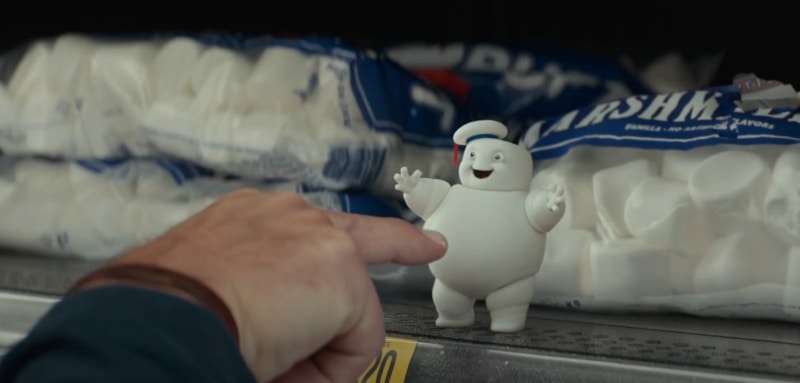
If you’re ready to trade “There is no Dana, only Zuul” for “There is no Mom, only Zuul,” then Ghostbusters: Afterlife will work surprisingly well for your needs. If you cling to the sly perversion of the original Ghostbusters, then Jason Reitman‘s reverential four-quadrant crowdpleaser will leave you feeling hollow.
The director ignores the 2016 reboot and even the first sequel from 1989 but holds tremendous adoration for his father’s weirdo comedy, minus the comedy. Yes, there are jokes here, but mostly this new flick propels itself using nostalgic momentum.
Ghostbusters: Afterlife seems concocted by an adult who clings too tightly to their childhood notion of what the first movie is — a serious action-adventure where four buddies battled an ignorant system while saving the day from apocalyptic specters. Only through adult revisitation have I come to realize Ghostbusters is a gleefully ridiculous romp involving three crude man-children (Winston always had it together) stumbling into knighthood because the absurd horror they feared actually came to fruition.
Ivan Reitman’s Ghostbusters is a bizarre delight stuffed with uncomfortable, snickering sexual encounters with the living and the dead. Jason Reitman’s Ghostbusters: Afterlife wants to be The Goonies or The Monster Squad, but even those ’80-kids movies were allowed to bump against deviance and wickedness. Ghostbusters contained genuine danger. You’ve never felt safer watching Ghostbusters: Afterlife.
As father passes torch to son, Ghostbusters: Afterlife wishes to do the same for the characters. Egon Spengler is dead. Years ago, he abandoned his family to pursue a possible cataclysm in Summerville, Oklahoma. Now, he’s gone and has left his remote farmhouse to his daughter Callie (Carrie Coon) and her two children, Phoebe (McKenna Grace) and Trevor (Finn Wolfhard). They sure as hell don’t want to live there, but their crumbling financial situation leaves them no choice.
While Trevor attempts social integration at the local burger joint, Phoebe wanders through her grandfather’s home, uncovering hardware that will certainly raise hoots of recognition from the audience. Grace is exceptional as the skeptical new kid who accepts and resents her outsider status. When she’s finally paired with Paul Rudd as an overenthusiastic seismologist, the movie jolts alive.
Grace and Rudd come the closest to capturing the first movie’s skittish, neurotic energy, and their age difference only heightens this excitement. They’re two dopey kids crying catastrophe. Summerville is suffering daily quakes, but its citizens have quickly mastered willful obliviousness. They can’t possibly heed the warning from these oddballs. Meanwhile, those watching rapidly nod their heads, asking the world to catch up with its heroes.
Unfortunately, closing the distance between these two states of knowing drags the narrative of Ghostbusters: Afterlife into a pedantic coming-of-age plot. Trevor’s romantic fumblings with Lucky the Burger Queen (Celeste O’Connor) are painfully two-dimensional. Wolfhard has little to do other than look dopey and adolescently frustrated. He drags these nerves with him into Egon’s barn, letting his angst push the pedal to the metal on Ecto-1. And, yeah, the converted Cadillac charging through cornfields supplies a dynamite frame. You’ll be itching for Ray Parker Jr.’s tune, but Reitman is playing tantric with that one.
Too much of Ghostbusters: Afterlife keeps its characters in the dark. The movie is cooking a mystery where every member in the audience is nearly aware, if not fully aware, of what’s happening. The town is haunted to the point of rupture. If Egon’s family doesn’t put two and two together soon, it’s adios for the rest of us.
At a certain point, Ghostbusters: Afterlife revs its references to a cacophonous volume. Some will cringe while others will no doubt embrace. Given my mood, I could probably swing either way, but on the evening I watched the sequel, I was in a loving place and chose to accept the sentimental bombardment. And it’s with a certain callback where Ghostbusters: Afterlife feels the most aligned with the original movie’s twisted humor.
The younger Reitman does not give us one Stay Puft Marshmallow Man; he gives us an entire army, in miniature. While scrounging for toppings to pair with his Ant-Man–approved ice cream, Rudd is attacked by these gooey demons. Whether they’re tearing into his fingers or skewering each other over open flames, the mini-Stay Pufts are joyously cooing. The sound and the image of their smiling, enflamed faces is appallingly distressing, and it’s in their death rattles where it becomes so wretchedly clear how safe the rest of the movie is playing its comedy.
The more and more Ghostbusters: Afterlife winks backward, the more it reveals itself as a misguided endeavor. If you can miraculously sever the old from the new — meaning you’re probably a child yourself, or at least, not a child of the ’80s — then you might recover a perfectly satisfying and spooky kiddie caper. Such a feat sounds impossible, but I remember watching Terminator 2: Judgment Day years before seeing The Terminator and I never felt lost at sea. Ghostbusters: Afterlife‘s problem is Ghostbusters and the reverence that I and those like me hold for it. Plus the reverence one Reitman holds for another: his dad.
In treating the first movie like a holy text, rather than the icky hilarious fluke that it was, Jason Reitman denies Ghostbusters: Afterlife the chance to be its own thing, which it clearly desires. This makes for a viewing experience among the strangest I’ve had in a while. I want to be like Trevor and Pheobe, somehow utterly unaware of the 1984 Manhattan ghost attack. But I can never stop being Paul Rudd’s character, giddy and bouncing at the thought of someone asking, “Who you gonna call?”
The references trigger enough endorphins to get you through the runtime, but everything around them lacks mischief.
Related Topics: Ghostbusters

